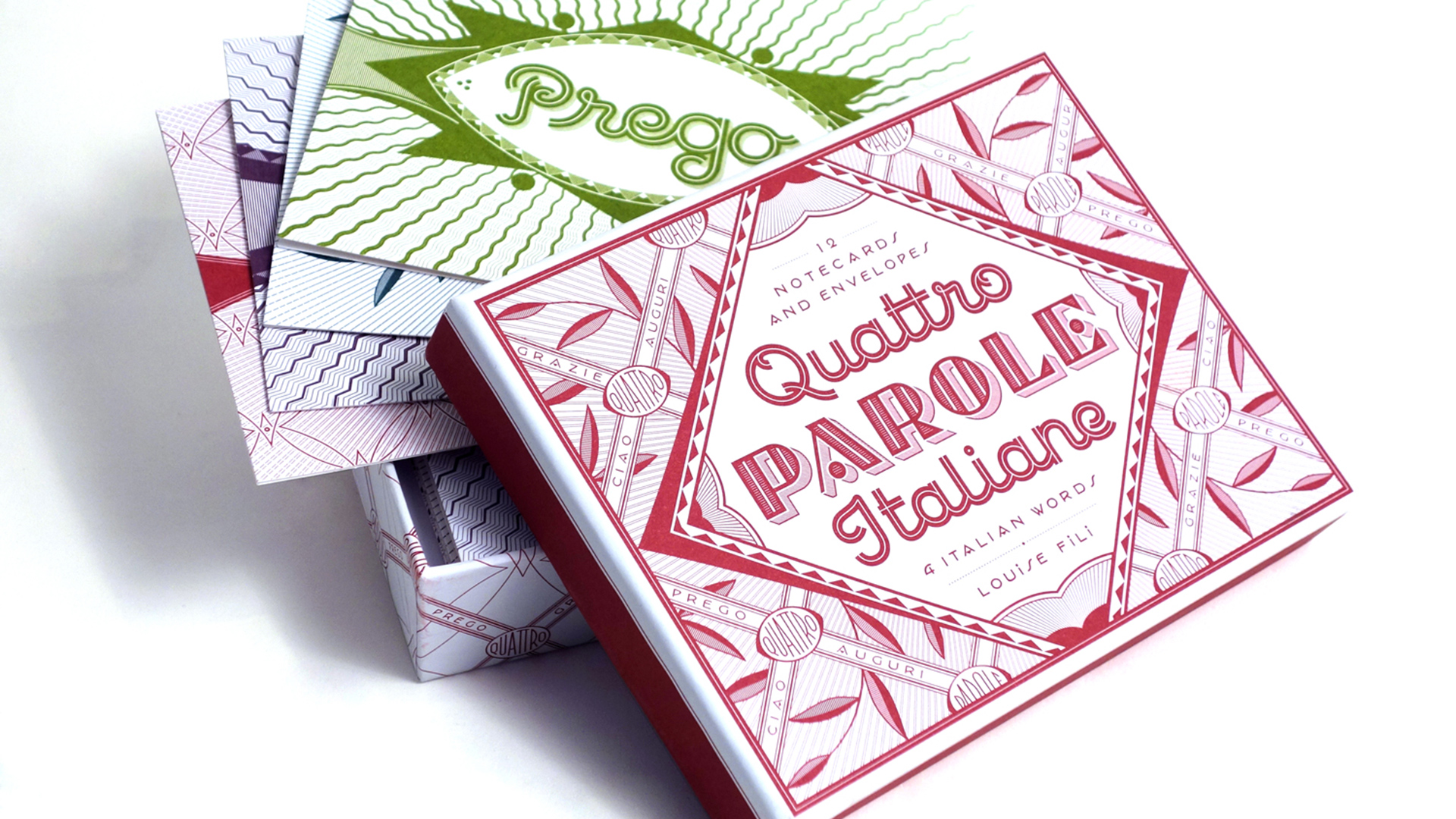Products |
Louise Fili: Quattro Parole Italiane: 12 Note cards and Envelopes
By
Published: May 30, 2017
Category:
Art
Amazon, which set out to put America’s bookstores out of business and nearly succeeded, now has opened seven brick-and-mortar stores. This inspired Courtney Maum, a trend forecaster turned futurist, to wonder what that portends:
I predict that the next big thing will be slow communication. And what’s slower than the mail? Bookstores should start beefing up their stationery selections, because we’re about to see a rising interest in letter writing again.
I agree, but for a different reason. I see tectonic plates moving, as two patrimonies — the Deep State and the President’s Primitive State — fight to the death. In that epic contest, you and I are gnats. Sure, organize, do what you can to tip the political balance in 2018. But you may do more to help the planet if you get closer to your friends and family. And not just with the easy defaults, Facebook and Instagram. Write letters. With pens. On paper. Because no other kind of communication is more personal and honest. None makes you more worthy of friendship and love.
Start with cards, with Louise Fili. The first time I wrote about her, you bought so many of her Perfetto Pencils that Amazon sold out and her publisher called me to ask how that happened.
She went on to create a box of a dozen note cards and envelopes that are just as distinctive. “Quattro Parole Italiane” is the idea. Four Italian words: ciao (hello), auguri (greetings), grazie (thank you) and prego (with pleasure).
Why are these cards so striking? It’s not the words, which are refreshingly ordinary, but the typography, which is dramatic and different and, at the same time, nostalgic and familiar, taking you back to visits to small towns in Italy or, more likely, period movies like The Conformist. [To buy the “Quattro Parole Italiane” note cards from Amazon, click here.]
Why cards?
Once, when I was in Milan researching a book on Italian art deco, I found myself one stifling afternoon in a magazzino — a warehouse — filled with printers’ proofs of labels and other ephemera from the 1920s. And I found a series of pasticceria papers, all created by hand. They were the most unusual and beautiful graphic work I’d seen in a long time. I brought them back to New York, where they ended up having a great influence on my design voice. Quattro Parole Italiane is a love letter to the anonymous designers who provided me with such unforgettable inspiration.
An Italy lost, an Italy of the imagination — this is Fili territory. In a digital age, her work couldn’t be more analog. And more specific: Her inspiration is an era in Italian design that begins roughly in 1920 and ends with the neonization of signage in Italy around 1960. You get the idea: Louise Fili may live and work in New York, but her head and heart resides in Italy.
But let her explain….
When I was 16, I took my first trip to Italy with my parents, who were both born there; it was their first trip back. I remember taking a flight into Milan, and as we were leaving the airport, the first thing I saw was an ad for Baci Perugina —that was the only type on it. I was immediately fascinated by the billboard, which showed a couple in a passionate embrace. I knew that Baci meant “kisses,” but I didn’t know that it was advertising at all. It didn’t matter; I was smitten. It was a three-way epiphany for me, because that’s when I fell in love with type, food, and Italy all at once.
She started her career as a book designer, and quickly advanced to the top of that field; from 1978 to 1989, she was art director of Pantheon Books, where she designed 2,000 book jackets. When she opened her own studio, she made a sharp turn into restaurant logos and food packaging. You’ve seen her work: Tiffany, Paperless Post, Williams-Sonoma, Sarabeth’s, Tate’s Cookies and many more.
The first office for her design firm was in her home. Now she walks to work, but her office fools visitors — it could almost be an apartment. For Fili, all work spaces are launching pads: “Surrounded by objects that I treasure, I always feel at home, and at the same time I am transported to Europe on a daily basis.”
As a life experiment, try this. Get pen and paper. Write a letter. See if you get transported.


